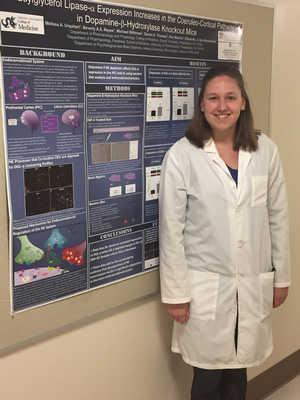
Hometown: Latham, New York
Undergraduate: University of Tulsa
Student's next step: West Virginia College of Medicine (Class of 2021)
Tell us a little about your background before you came to Drexel.
I went to the University of Tulsa and received a degree in biochemistry. I was also a student athlete on the women's rowing team, which is a Division I team in the American Athletic Conference. During my senior year, I was a co-captain of the team. I was involved in the Student Athlete Advisory Committee, which is a committee of student athletes with representative for each sport that is responsible for protecting the best interest of student athletes. I served as president of SAAC during my junior and senior years of college. I also did undergraduate research with my biochemistry professor and sports science professor. Our research focused on stress during exercise, specifically on measuring hormonal levels in saliva before and after exercise.
Why did you choose to enroll in a post-baccalaureate program?
I always had medicine in the back of my mind, but I really didn't know 100% what I wanted to do. I also had research experience so I did not know if that was something I wanted to do either. I found myself in a limbo of what I wanted to do, which has led me to the IHS program. The IHS program gave me the opportunity and flexibility to take classes that I am interested in and provided me the chance to figure out what I truly want to do. It gave me the ability to shadow more people in different fields and offered me more experiences. I was able to shadow a neuropsychologist and a neurologist at Drexel and a neurologist at Jefferson Hospital.
My experiences in the program led me to make the final decision to pursue medicine. This program has helped build my confidence with my success in graduate level classes. This success helped me realize that I can go to medical school and perform well in those classes.
If someone gave you one million dollars to donate to a single charity, what charity would you pick and why?
Recently, I have volunteered at homeless shelters, in both Albany, my hometown, and in Philadelphia. I have done everything from cooking meals to cleaning floors. One of my favorite memories was baking a birthday cake for a five-year-old. He was so excited and thankful because he wasn't expecting it. These experiences have given me a new perspective on the struggles the homeless population. I think I would use the money to create a new homeless shelter that will help meet their needs.
Do you currently participate in any extracurricular activities or volunteer work?
I still volunteer at the Student Run Emergency Housing Unit of Philadelphia (SREHUP). SREHUP is run by student and faculty volunteers from local universities. Volunteers help cook and serve dinner to the men at the shelter. When I am home in Albany, I volunteer at a local shelter. My family is also very involved our local firehouse so I help out there when I can as well.
Tell us about your current lab research.
The focus of my research is to investigate the mechanisms of the endocannabinoid system in the brain. Endocannabinoids are involved in the regulation of many physiological processes, including the behavioral responses to stress by modulating norepinephrine signaling. Dysregulation of norepinephrine in the brain is an implication of many neurological and psychiatric disorders. By understanding the mechanisms of the endocannabinoid system and its relationship to norepinephrine in the brain, pharmacological advancements can be made to treat neurological and psychiatric disorders, specifically exploring the uses of cannabis as a therapeutic agent.
What do you think has allowed you to be a successful student?
Support from my mentors has contributed for my success. Everyone, particularly Dr. Gaurnier-Hausser, Dean Van Bockstaele, Dr. Reyes and Matt Sanuck, has influenced and contributed to my success in the IHS program. I was able to learn not only what interests me, but also take classes that helped me work toward my goal of medical school.
The flexibility of the IHS program also helped me be successful. Having passion about what I was working on or learning helped me solidify my interest in medicine. The IHS program has really allowed me to find what I am good at and work on everything that needs to be worked on to become a better student.
As one of our top students, what advice would you give to current and future IHS students?
Take advantage of all opportunities that you are given thought the program. You need be willing to give a lot of time and effort to take advantage of everything that is offered. If you put in the time and effort, you will be able to succeed and meet your goals.